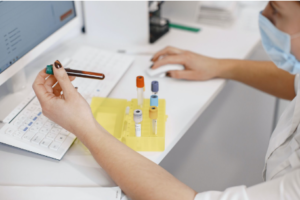Blood Work Need Fasting
Fasting simply means you cease eating completely for a certain period. It is frequently required by doctors for common blood tests to have an ideal understanding of the patient’s health status or condition. It is important to fast in order to ensure that your test results are reliable as all the compounds found in food and drinks we consume might affect the levels of certain substances in the blood.
Why Is It Important to Fast?

Fasting before a blood test can affect the accuracy of certain measurements in your blood such as glucose and cholesterol levels.
When you eat, your body converts carbs into glucose and produces insulin to help transport glucose to your cells. The glucose levels may be increased if you have recently eaten before the blood test, which makes it more difficult to interpret the results, especially for diabetes or other conditions that affect glucose levels.
If your test is required fasting you should follow the instructions given by your doctor as fasting can avoid inaccurate results that can cause unnecessary stress and prompt decisions which can lead to unwanted and costly additional tests and other medication.
How Long Should You Fast?
Most blood tests need you to fast for at least 8 to 12 hours in order to get the most accurate results.
However, following the instructions given by your healthcare provider is important as certain tests may require longer or shorter fasting times, or may allow you to drink water or other liquids during the fasting period.
Which Blood Tests Need Fasting?
Several blood tests require fasting to have reliable results. This is because fasting helps to guarantee that recent meal intakes do not corrupt the test findings. These are a few instances of typical blood tests that usually need fasting:
- Blood Glucose Test – This test measures the glucose or sugar level in your blood and is used to diagnose diabetes and monitor the blood glucose levels of people with diabetes. It is often necessary to fast for 8 to 12 hours before the test to get an accurate reading.
- Cholesterol Level Test – When you get a cholesterol blood test it usually measures the cholesterol in three different types of lipoproteins as LDL, HDL, and VLDL. LDL is low-density lipoprotein and is often referred to as bad cholesterol because high levels can cause the risk of heart diseases while HDL is referred to as good cholesterol as it helps to remove excess cholesterol from the bloodstream. VLDL is a type of lipoprotein that carries another type of fat in the blood.
By measuring the levels of cholesterol in these different lipoproteins, doctors can get a better understanding of a person’s risk for heart disease and other health problems related to cholesterol levels.
- Iron Level Test – Iron is a mineral that is important for making red blood cells that carry oxygen to different parts of the body. The test measures the amount of iron in your body and helps doctors diagnose conditions such as iron deficiency (anemia) or iron overload.
- Vitamin B12 Test – Your body needs vitamin B12 to generate red blood cells and to maintain a healthy nervous system. The test is used to diagnose vitamin B12 deficiency, which can result in fatigue, weakness, tingling in the hands and feet, and difficulty in thinking or remembering.
- Basic Metabolic Test – The test usually checks the blood sugar, electrolyte, and flood balance, and kidney function. By measuring these substances doctors can better understand how well is your body functioning and detect the imbalances or abnormalities that may need further treatments.
Things to Remember When You Fast
- You have to make sure how long you need to fast according to the required test and what you can and are not allowed to consume during the fasting period.
- Avoid food and beverages except for water during the fasting period as it may affect the results of the blood test.
- Follow the doctor’s instructions regarding whether to take them during the fasting period if you’re currently taking any medications.
- Avoid doing any intensive workouts the day before the blood test since it might alter the results.

At Calgary Drug Mart we offer reliable lab requisitions for your blood work to ensure you get the accurate and timely results you need.

